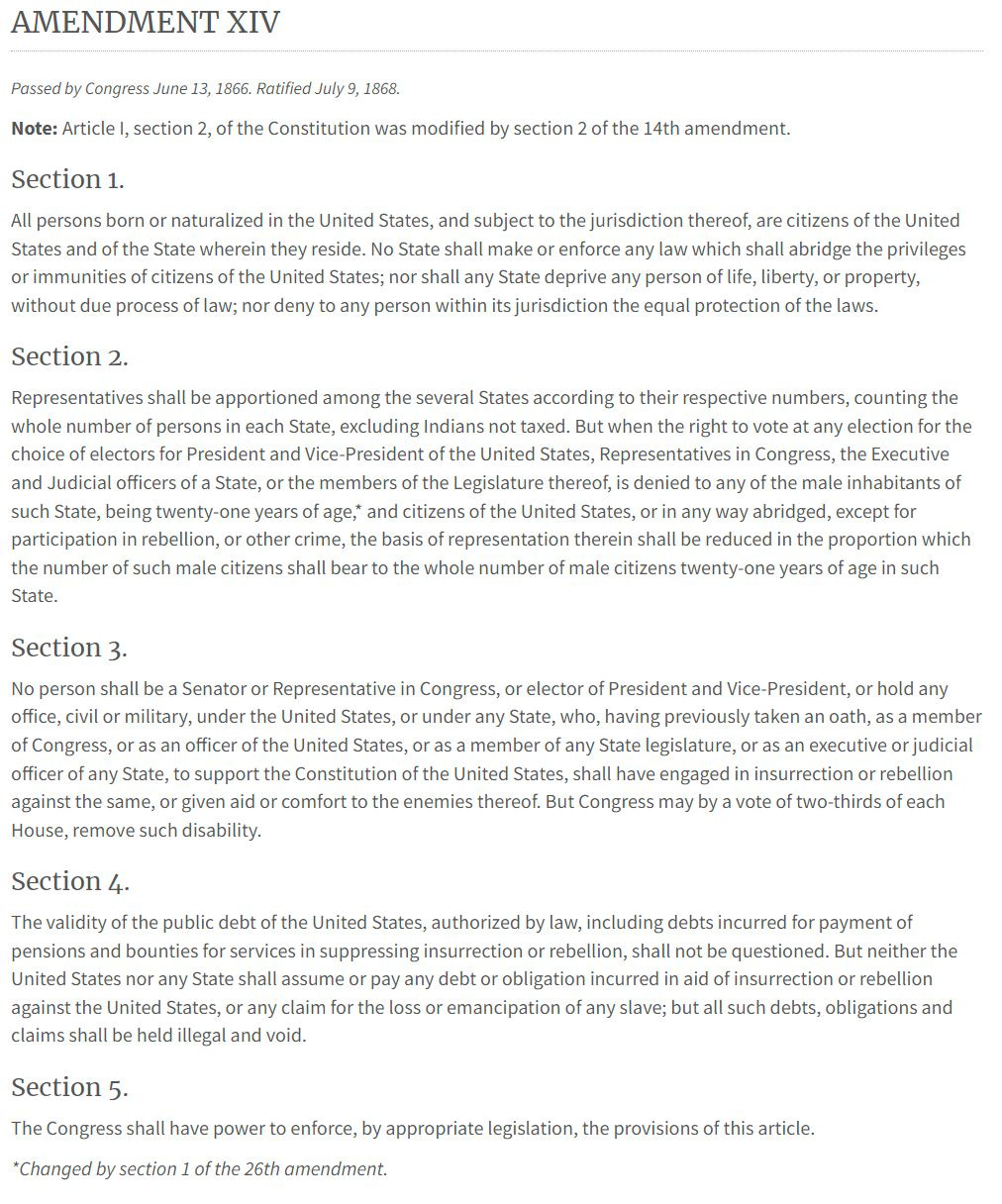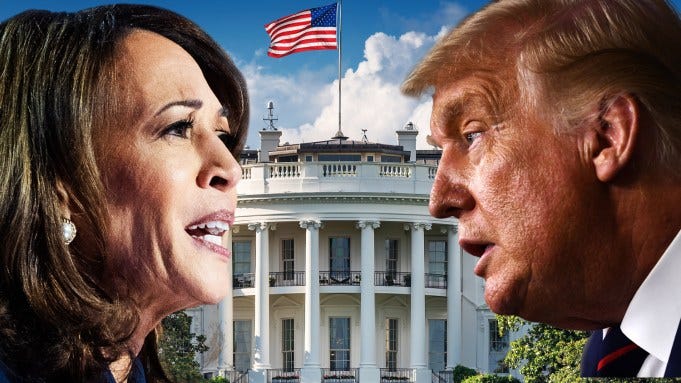In the contemporary workplace, the concept of due process sounds foreign and governmental. I argue today that due process ensures fair treatment and protection of employees' and employer’s rights. This week, we delve into the roots of due process, its incorporation into the U.S. Constitution, and its critical role in shaping workplace systems to protect supporters like you. Additionally, we explore instances where due process protections have come under scrutiny, specifically examining concerns surrounding the alleged violations of Donald J. Trump's due process rights by the U.S. and State Governments.

The sources for this article:
Peter Strauss, Cornell Law School, accessed 23 January 2024, https://www.law.cornell.edu/wex/due_process.
National Archives, accessed 23 January 2024, https://www.archives.gov/founding-docs/bill-of-rights-transcript and https://www.archives.gov/founding-docs/amendments-11-27.
Paul Falcone, September 6, 2017, SHRM, “The Elements of Due Process,” accessed on 23 January 2024, https://www.shrm.org/topics-tools/news/employee-relations/elements-due-process.
National Labor Relations Board, accessed 23 January 2024, https://www.nlrb.gov/rights-we-protect.
Donald J. Trump vs. Norma Anderson, U.S. Supreme Court Brief on Merits, Docket No. 23-719, (2023).
Merriam-Webster Dictionary, accessed 24 January 2024, https://www.merriam-webster.com/.
Title 18, USC § 2383, 23 January 2000.
Due process is a protection of the removal of your rights, expressed in law, but not based on substance alone. In the workplace, they protect through a process that adjudicates differences. It is not a method that grants automatic validity to your opinion. As a supporter, you are often the expert on a topic, due process allows you a chance to present your opinion, not a method that guarantees agreeance. Due process should allow leaders and supporters to balance beliefs that overlap, or are antithetical to each other, but may appear equally valid.
It is troubling to work in an organization where your beliefs are not approved, but it is detestable that you are not given a chance to present your side. When supporters seek employment in organizations that have due process, it protects the right to have judgment provided based on facts. Due process is rooted in the belief that an organization “must operate within the law ("legality") and provide fair procedures” (Strauss).
Foundations of Due Process.
Due Process is codified in the United States of America laws through the Fifth and Fourteenth Amendments, where the principles of procedural and substantive due process were articulated. U.S. constitutional writers wanted to safeguard individuals from arbitrary deprivation of life, liberty, or property by the government. This foundational principle was meant to ensure fairness, transparency, and protection for all citizens.


We can see these ramifications in real time as several states attempt to restrict Donald J. Trump’s liberty by removing him from voter roles as he campaigns for President of the United States of America in 2024. Should Donald J. Trump be allowed on state ballots based on his actions on 6 January 2021? Around 30 states are currently arguing that the 14th Amendment, which supports the Due Process Clause, restricts Donald J. Trump from being eligible to run for any office in the United States of America.
U.S. citizens should use due process to answer whether Donald J. Trump committed an insurrection. However, people always look past the fact that no court, the system the United States of America uses to determine criminal guilt, has convicted him or any other person at the capitol on January 6th for insurrection. The question then arises, was January 6th an insurrection? Let’s start by looking at the definitions.
18 USC 2383 “Whoever incites, sets on foot, assists, or engages in any rebellion or insurrection against the authority of the United States or the laws thereof, or gives aid or comfort thereto, shall be fined under this title or imprisoned not more than ten years, or both; and shall be incapable of holding any office under the United States.
Rebellion means, “open, armed, and usually unsuccessful defiance of or resistance to an established government” (Merriam Webster Dictionary)
Insurrection means, “an act or instance of revolting against civil authority or an established government” (Merriam Webster Dictionary)
Revolt means, “to renounce allegiance or subjection (as to a government)” (Merriam Webster Dictionary)
The law requires if Donald J. Trump is guilty, to have engaged in rebellion (armed defiance) or insurrection (renouncing of allegiance) to commit Insurrection. As you examine the events of January 6th, he did neither. Not only were there no weapons in the crowds, but Donald J. Trump did not conduct an armed resistance nor did he renounce his allegiance to the United States of America. In fact, he unsuccessfully tried to utilize legal avenues and courts to remedy what he believed was a lack of electoral votes in the 2020 election results.
Many argue that the 14th Amendment does not require conviction. They point to section 3 which states, “having previously taken an oath…shall have engaged in insurrection or rebellion against the same” (14th Amendment). They attempt to argue that engaging does not mean being convicted. However, I have shown that it still does not apply because it wasn’t an insurrection according to all laws and definitions. You might still disagree with my interpretation, and you may still think it disqualifies Donald J. Trump. But once again this argument does not stand either because you still have to reconcile with Section 1 of the 14th Amendment.
Section 1 is where the Due Process Clause was applied to states and federal governments to “deprive any person of life, liberty, or property without due process of law, nor deny to any person within its jurisdiction the equal protection of the laws” (14th Amendment). We learned above that this is necessary to eliminate tyrannical actions against people from authority. People supporting Donald J. Trump’s illegitimacy are willing to deprive him of his right to liberty without any due process. They use part of the 14th Amendment but throw out the other part which defeats their position. As a supporter, how unfair would you consider an organization that punished you before even allowing you due process?
If we allow a government or businesses to determine who has a voice based on opinion and without due process, these organizations become illegitimate. Any organization that uses authority to remove your right to life, liberty, or property without proof or evidence, without legal process, or reliable outcomes, is by definition, tyrannical. Tyranny leads to abuse and corruption which throughout history leads to death and false imprisonment at the governmental level. In business, it leads to a hostile work environment, toxic branding, and low hiring rates.
Congruently, the due process argument supports the view that impeachment opinions also infringe upon the rights of liberty afforded to all citizen, regardless of their position. The U.S. Constitution gives the House of Representatives the right to conduct impeachment investigations and the U.S. Senate to conduct the impeachment trial. The writers of the U.S. Constitution wanted a person under impeachment proceedings to argue their position in the House of Representatives and receive a trial in the U.S. Senate. If we continue to use the narrative that a president is impeached only after the House of Representatives decision, we will continue to violate citizens’ due process protections. We must consider due process protections for the whole process, and not half of the process, before labeling citizens guilty.
Examining due process in the correct context, recent events against Donald J. Trump’s rights to liberty, as well as a proper understanding of impeachment procedures, we see an erosion of proper governance. The controversy surrounding the violation of Donald J. Trump's due process rights underscores the ongoing tension between individual rights and the authority of government institutions.
It is a reminder for any organization why due process is important to good leadership as well as shows supporters what organizations to apply. We can all learn that rights are inherent to our nature, we should protect them, and we should not allow anyone to erode them. As we will discuss below, supporters seeking employment should not bother with any organization that operates that way. We will also discuss tips and policies you can request from your leaders to improve your work environment.
Due Process in Business Systems.
In the corporate landscape, due process extends beyond the legal realm into the heart of organizational policies and procedures. Human resources practices, employee handbooks, and well-defined grievance mechanisms are examples of how businesses operationalize due process. Effective due process mechanisms not only foster a positive work environment but also contribute to employee morale, engagement, and overall organizational success.
Subscribe to The Davark Group Substack to keep reading.
https://thedavarkgroup.substack.com/p/week-4-due-process-in-the-workplace















